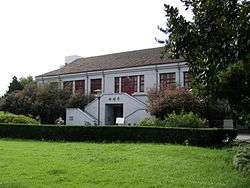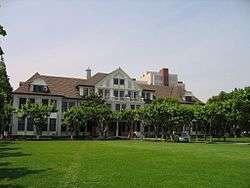Fudan University
|
复旦大学 | |
 | |
Former names |
Fudan Public School Fudan College National Fudan University Private Fudan University |
|---|---|
| Motto | 博学而笃志,切问而近思[1] (Scientia et studium, quaestīo et cogītātīo) |
Motto in English | Rich in knowledge and tenacious of purposes, inquiring with earnestness and reflecting with self-practice[2] |
| Type | Public |
| Established | 1905 |
| President | Xu Ningsheng (许宁生) |
| Party Secretary | Jiao Yang (焦扬) |
Academic staff | 2,700 |
Administrative staff | 5,800 |
| Students | 31,900 |
| Undergraduates | 14,100 |
| Postgraduates | 14,800 (including doctoral students) |
Other students | 3,000 (exchange students) |
| Location | Yangpu District, Shanghai, China |
| Campus |
604 acres Urban: Handan campus, Fenglin campus, Jiangwan campus Suburban:Zhangjiang campus |
| Founder | Ma Xiangbo, S.J. (1905) |
| Affiliations | C9, Universitas 21, AEARU, APRU, BRICS Universities League, Council on Business & Society |
| Website | www.fudan.edu.cn |
Fudan University (simplified Chinese: 复旦大学; traditional Chinese: 復旦大學; pinyin: Fùdàn Dàxué), located in Shanghai, China, is a C9 League university that is one of the most prestigious and selective universities in China.[3] It is a Chinese Ministry of Education Class A Double First Class University.[4] Its institutional predecessor was founded in 1905, shortly before the end of China's imperial Qing dynasty. Fudan is now composed of four campuses in Shanghai – Handan (邯郸), Fenglin (枫林), Zhangjiang (张江), and Jiangwan (江湾) – which share the same central administration.
History
Fudan, formerly romanized as Fuh Tan, was initially known as Fudan Public School in 1905. The two Chinese characters Fu (复) and Dan (旦), literally meaning "(heavenly light shines) day after day", were chosen by Father Ma Xiangbo SJ, from the Confucian Classic Shangshu Dazhuan (Chinese: 尚书大传): "Itinerant as the twilight, sun glows and moon luminesces" (Chinese: 日月光华,旦复旦兮). In 1911 during the Xinhai Revolution the college was taken up as the headquarters of the Guangfu Army and closed down for almost one year. The university motto comes from Analects Book 19.6 (Chinese: 博学而笃志,切问而近思), which means "to learn extensively and adhere to aspirations, to inquire earnestly and reflect with self application".
In 1917, Fudan Public School became a private university named the Private Fudan University, and also had a middle school and university-preparatory school. In 1929, Fudan adjusted its departments, expanded to include the Journalism Department, Municipals Department, Law Department and Education Department, totalling 17 departments devoted to Arts, Science, Law and Business.
After the Japanese invasion of China in 1937, Fudan moved with the Kuomintang government to the inland city of Chongqing, the wartime Chinese capital. On 25 December 1941, the First Meeting of Fifth Conference of the Highest Executive Authority of the National Government of the Republic of China voted to change Fudan University (Chongqing) to a public university with Wu Nanxuan as its president. Fudan University then became National Fudan University. After the end of World War II, it moved back to Shanghai.
After the founding of the People's Republic of China in 1949, Fudan lost its "National" appellation and became Fudan University to reflect the fact that all universities under the new socialist state would be public. Fudan was the first university to be adjusted by the new government in 1952 and modeled on Soviet education. The original departments were changed, and Arts and Science departments from at least ten other universities in eastern China were added.
In the late 1970s, after the Cultural Revolution, the university was changed to a modern, comprehensive-style university.
Fudan University and Shanghai Medical University were merged on 27 April 2000.
Institutions


Organizations
Fudan University comprises 17 full-time schools, 69 departments, 73 bachelor's degree programs, 22 disciplines and 134 sub-disciplines authorized to confer PhD degrees, 201 master's degree programs, 6 professional degree programs, 7 key social science research centers of Ministry of Education P.R.C, 9 national basic science research and training institutes and 25 post-doctoral research stations. It has 40 national key disciplines granted by the Ministry of Education, nationally third. At present, it has 77 research institutes, 112 cross-disciplinary research institutes and 5 national key laboratories. See a list of schools and departments at Fudan.
Fudan University enrolls over 45,000, including full-time students and students in continuing education and online education. Additionally, there are nearly 1,760 international students, ranking second nationally.
Fudan University has a high-level research faculty of over 2,600 full-time teachers and researchers, including 1,350 professors and associate professors, 30 academicians of the Chinese Academy of Sciences and the Chinese Academy of Engineering, nearly 660 doctoral supervisors, 26 special professors and 2 lecture professors of "Cheungkong Scholars Program", 3 distinguished professors and 10 special professors of Fudan University, 6 principal scientists of Project 973 and 25 "Young Experts with Prominent Contributions to the Country".
Fudan University has 10 teaching hospitals, such as Zhongshan Hospital and Huashan Hospital, integrating medical service, medicine education and research.
Fudan University has an "International Student's Dormitory", a building reserved as living quarters for any students from countries other than China studying either degree or non-degree programs. Notable alumni include Jennifer Chu and Audrey Lamsam of Arcadia, California, who started a nonprofit organisation called "Food4Me" in 2012. This organisation first stemmed from their studies as non-degree Chinese students at the university.
Fudan is a member of Universitas 21, an international consortium of research-driven universities.
Dr. Ren Xiao is the director of the Center for the Study of Chinese Foreign Policy and The Rising Powers Initiative Co-Directors.[5]
The Guanghua Twin Towers (Chinese: 光华楼) at the center of the Handan campus reach 140.5 meters, reportedly the highest buildings ever constructed in a university campus in China.
The High School Affiliated to Fudan University, located on the Handan campus, is one of the most prestigious high schools in Shanghai.
Library
Fudan University Library was formally established in 1922, previously known as the Reading Room of Wu Wu (1918). Today it comprises the Liberal Arts Library, the Science Library and the Medical Library, with a total floor of 29,000 square meters.
By the end of 2004, the Library's collection composed of more than 4.4588 million copies and articles, including books, journals, bound volumes of newspapers, and audio-visual recordings. Of all these 400,000 are thread-bound books of Chinese classics (including 7,000 rare copies), 100,000 are books published during the reign of the Republic of China, and 1.392 million are foreign books. Additionally, there are 32,000 Chinese and foreign journals and periodicals. Every year 100,000 new books will be added to enlarge the collection. The library subscribes to around 7,000 printed journals.
The library has access to 24,000 full-text e-journals and over 150 CD and online databases. It has eight open stacks, two general reading rooms and 19 reading rooms with specialized functions, totaling 2,400 seats. The library is open for 112 hours weekly and serves more than 7,000 visiting readers daily.
The Fudan University Library is divided into the China Academic Humanities and Social Sciences Library (CAHSL), the National Foreign Textbook Center for East China (sponsored by the Ministry of Education), the Documentation and Information Center for Liberal Arts, and the Central Stacks for Foreign Books of Liberal Arts. Additionally, the library has the Shanghai Electronic Documents Searching Center for Graduates, the CD Searching Center Shared by the Universities in Northeast Shanghai, and the General Search Station for Updated Science and Technology Information Authorized by the Ministry of Education, the Search Station for Updated Science and Technology Information Authorized by the Shanghai Science and Technology Committee. The Library edits and publishes two journals: China Index and Information Services of the Higher Education Institutions in Shanghai.
The library's integrated computer management system has been upgraded several times. In addition to general services, the Library provides services of international online information retrieval, various types of e-resources searching, interlibrary loans, document delivery service, online consultation, updated information search, user training, tape duplication, multimedia viewing, document duplication and binding, etc. The courses of literature and information retrieval are designed for Library users of different levels.
Student associations
There are four categories of student associations: Academic Societies, Practical Societies, Artistic Societies, and Physical Culture Societies. See also Student Associations at Fudan.
Presidents
Public:
- 1905–1906 Ma Xiangbo (马相伯)
- 1906–1907 Yan Fu (严复)
- 1907–1909 Xia Jingguan (夏敬观) (Chancellor)
- 1909–1910 Gao Fengqian (高凤谦) (Chancellor)
- 1910–1912 Ma Xiangbo (马相伯)
- 1913–1917 Li Denghui (李登辉)
Private:
- 1917–1936 Li Denghui (李登辉)
1918 Tang Luyuan (唐路园) (Acting)
1924–1925 Guo Renyuan (郭任远) (Acting)
- 1936–1940 Qian Xinzhi (钱新之) (Acting)
National:
- 1940–1943 Wu Nanxuan (吴南轩)
- 1943–1949 Zhang Yi (章益)
PRC:
- 1949–1952 Zhang Zhirang (张志让)
- 1952–1966 Chen Wangdao (陈望道)
- 1972–1977 Chen Wangdao (陈望道)
- 1978–1983 Su Buqing (苏步青)
- 1983–1988 Xie Xide (谢希德)
- 1988–1993 Hua Zhongyi (华中一)
- 1993–1998 Yang Fujia (杨福家)
- 1998–2009 Wang Shenghong (王生洪)
- 2009–2014 Yang Yuliang (杨玉良)[6]
- 2014 – Xu Ningsheng (许宁生)
Admissions
Undergraduate program

Fudan University's undergraduate program is extremely selective. Fudan is one of the five universities in China whose undergraduate programs are the hardest for students to get in: less than 0.2% of National College Entrance Examination ("Gaokao") takers can make it (As a comparison, the five choosiest Ivy League schools in 2012 let in three times the percentage (0.6%) of SAT-takers.).[7]
Fudan has reconstructed its course system to suit education goals. A course scheme of general education, specialized education and basic education in arts and sciences has been implemented. Encompassing a complete and comprehensive range of disciplines, the courses of general education enable students to receive education in diverse fields. All of the 70-plus undergraduate majors of Fudan have been put into seven general categories so that students can benefit on a broader scale from the systematic discipline training. According to the Education Scheme for Arts and Sciences, course modules are determined by discipline systems and course suits, and credits by course modules. In this sense, Fudan provides students with more options for their college studies. In contrast with the traditional syllabus, the new module has appropriately decreased the gross credits and class hours. Along with minor programs and extracurricular academic activities, it contributes greatly to the intellectual development of undergraduate students, exposing them to a wider range of knowledge.
Graduate program
The Graduate School of Fudan University was established on 6 November 1984 and the Graduate School of Shanghai Medical University on 25 January 1985. Both were among the first 22 graduate schools after China's universities officially resumed enrolling graduate students. With the merger of Shanghai Medical University and Fudan University in April 2000, the two graduate schools were joined to be a new Graduate School of Fudan University. Therefore, a comprehensive graduate education structure is formed with disciplines in humanities, law, sciences, engineering, medicine and management.
International students
Starting from the 1950s, Fudan has enrolled international students – one of the first few institutions in China to do so. Since then, Fudan has accepted and trained over 10,000 foreign students from 100 countries and regions worldwide. At the end of 2006, there were 2,812 international students studying at Fudan University, ranked number 2 in the nation. Half of them were actively pursuing degrees, the rest were general visiting scholars. In addition, Fudan enrolls over 1700 short-term students each year.
The international student programs consist of degree programs and non-degree programs.[8] The university has also established a Bachelor of Arts program called the "Chinese language for international students" and there have been seven groups of graduates. Besides all levels of Chinese language teaching, the university has opened courses such as Chinese literature, Chinese history, Chinese economy, Chinese philosophy and Chinese law for interested international students. These courses will introduce students to basic knowledge of Chinese social economy, history and culture, according to their different requirements. In addition, several graduate programs are offered in English. For instance Master of Business Administration, Master of Public Health, as well as other programs offered in conjunction with partner universities abroad. The university's programs in medicine leading to the Bachelor of Medicine, Bachelor of Surgery (MBBS) degree are also available to international students.
The International Students Office is responsible for the management of all international students at Fudan University.
Reputation and rankings
| University rankings | |
|---|---|
| Global | |
| ARWU World[9] | 101–150 |
| Times World[10] | 116 |
| QS World[11] | 40 |
| Regional | |
| Times Asia[12] | 16 |
| QS Asia[13] | 11 |
| National | |
| BCUR China[14] | 5 |
The QS World University Rankings (2015/16) considered it 43rd worldwide while it was 11th in the independent regional QS Asian University Rankings (2016)[15] and 3rd in QS BRICS University Rankings (2016),[16] respectively. Further, ARWU (2016) put it at a position among 101–150th globally.[17] It is among the top five universities in mainland China in all of the above league tables.
The QS subject ranking in politics and international relations for 2015 ranked Fudan's School of International Relations and Public Affairs (SIRPA) 40th in the world.
In the 2018 U.S. News Inaugural Global University Ranking, Fudan University ranks 4th in China and No. 148 in the world.[18]
Fudan now ranks 5th (2018) in China according to Shanghai Ranking Consultancy[19]
Campus

Fudan has established a campus structure called "one-body-two-wings", where the body is Handan (邯鄲) campus and Jiangwan (江灣) campus, which are only 2 miles (3.2 km) apart, and the two wings are Fenglin (楓林) campus and Zhangjiang (張江) campus. All the four campuses are in downtown Shanghai, and share the same central administration.
Handan campus
Handan campus, the main campus of Fudan, is located in Yangpu District, Shanghai. It contains the majority of the schools and departments. Freshman undergraduates live on this campus. Handan campus consists of four sub-campuses, namely the headquarters campus, the south campus, the north campus, and the east campus.
Fenglin campus
Fudan University Shanghai Medical College, or Medical Center of Fudan University (former Shanghai Medical University) is at Fenglin campus, located in Xuhui District, Shanghai. In July 2014, the campus began a 2-year large-scale construction project.About 4000 student move out of the old campus for the construction and in July 2017 students came back to it.[20]
Zhangjiang campus
Zhangjiang campus is located in Shanghai's Zhangjiang Hi-Tech Park, Pudong District. It comprises the School of Microelectronics, the School of Computer science and technology, the School of Software, and the School of Pharmacy.
Jiangwan campus
Only 2 miles (3.2 km) apart from Handan campus, Jiangwan campus is a new campus of Fudan University. The School of Law has moved to Jiangwan, and other schools will follow, including the School of Life Science, the College of Foreign Language and Literature, and School of Social Development and Public Policy.
Notable alumni
Today, associations organized by Fudan's alumni can be found in the United States, Japan, Australia, Canada, Taiwan, Hong Kong and mainland China.
Educationally, academically and economically, Fudan alumni's strengthened ties with their alma mater are playing a significant role in the development of the University. The routine services of these alumni associations include: updating contact lists, holding conferences, conducting Sino-foreign cultural exchanges, and keeping contact with other alumni associations throughout the world.
Li Deng-hui, ex-president of Fudan instructed the students to unite, serve and sacrifice. A well-known 77-year-old architect from the Alumni Association in Taipei also said that strength lies in unity and that Fudan alumni are expected to serve as an example in the increasing mergers of higher learning schools in mainland China.
A worldwide gathering is held annually in order to promote the relations between the alumni all over the world.
Notable Fudan alumni are listed below.
Government/Politics
- Yu Youren (于右任), politician of Republic of China.
- Zhang Zhirang (张志让), Federal Judge of PRC.
- Li Lanqing (李岚清), vice prime minister of PRC.
- Tang Jiaxuan (唐家璇), foreign minister of PRC.
- Chen Zhili (陈至立), minister of education of PRC.
- Jiang Jufeng (蒋巨峰), Governor of Sichuan Province.
- Liang Baohua (梁保华), Governor of Jiangsu Province.
- Bagatur (巴特尔), Governor of Inner Mongolia.
- Shao Lizi (邵力子), politician.
- Wang Huning (王沪宁), member of the 18th Politburo of the Communist Party of China.
- Li Yuanchao (李源潮), Vice President of the People's Republic of China.
- Chen Jian (陈健), vice Secretary-General of the United Nations
Humanities and social sciences
- Chen Yinke (陈寅恪), linguist
- Jianqing Fan (范剑青), Statistician, Financial Economics, Princeton University
- Hanming Fang (方汉明), Economist, University of Pennsylvania
- Yingyao Hu (胡颖尧), Economist, Johns Hopkins University
- Panle Jia (贾攀乐), Economist, Cornell University
- Wei Jiang (姜纬), Economist, Columbia University
- Zheng (Michael) Song (宋铮), Economist, Chinese University of Hong Kong
- Shang-Jin Wei (魏尚进), Economist, Columbia University
- Lin Zhou (周林), Economist, Shanghai Jiaotong University; Fellow of Econometric Society
- Yihong Xia (夏一红), Economist, Wharton School, University of Pennsylvania
- Qiu Xigui (裘锡圭), historian and palaeographer
- Xu Fancheng (徐梵澄), scholar, poet and artist
- Wu Lifu (伍蠡甫), artist.
- Luqiu Luwei (闾丘露薇), journalist
- Charles Burton (黄承安), sinologist, former Canadian diplomat and senior Government advisor, political scientist of Brock University in Canada.
- Wu Jinglian (吴敬琏), economist
- Liam D'Arcy Brown, British travel-writer and sinologist
- Liang Xiaosheng, novelist and screenwriter
- Li Wenjun, Chinese translator and prose writer.
Natural sciences and mathematics
- Zhu Kezhen (竺可桢), meteorologist, educator, PhD from Harvard University.
- Tong Dizhou (童第周), biologist.
- Jiang Mianheng (江绵恒), engineer and one of the vice presidents of Chinese Academy of Sciences.
- Fujia Yang (杨福家 Yang Fujia), physicist and university administrator, the chancellor of the University of Nottingham.
- Li Ta-tsien (李大潜 Li Daqian), mathematician and member of the French Academy of Sciences.
- Shen Zhi-Xun (沈志勋), physicist, professor at Stanford University.
- Shoucheng Zhang, physicist, professor at Stanford University.
- Li Jun (李俊), mathematician, professor at Stanford University.
- Chen Dayue (陈大岳), mathematician and statistician, professor at Peking University.
- David D. Yao (姚大卫 Yao Dawei), professor at Columbia University.
- Ying Natasha Zhang (Natasha Foutz), professor of management at the R.H Smith School of Business, University of Maryland
- Lode Li (李乐德), professor of management at the Yale School of Management.
- Junying Yuan, Biologist, professor at Harvard University.
- Xu Tian (许田), Biologist, professor at Yale University.
- Wei Yang, Biologist, senior investigator at NIH.
- Zucai Suo, Biochemist, professor at The Ohio State University.
- Xiao-Li Meng (孟晓犁), mathematician and statistician, chair professor at Harvard University
- Jianqing Fan, statistician, professor at Princeton University
- Xuming He, Professor of Statistics, University of Michigan
Medicine
- Chen Zhongwei(陈中伟), expert of orthopaedic surgery and microsurgery, one of the pioneers of the process of reattaching severed limbs.
- Shen Ziyin (沈自尹)
- Gu Yudong (顾玉东)
- Tang Zhaoyou (汤钊猷)
- Tang Yuhan(汤于翰), an eminent oncologist in Hong Kong. He was the president of Hong Kong Chinese Medical Association and the founder of Tang Fund
- Chen Haozhu (陈灏珠)
- Wen Yumei (闻玉梅)
- Zhou Liangfu (周良辅)an eminent expert of Neurosurgery[21]
Business
- Zhang Shengman, managing director of World Bank Group
- Qi Lu, President of the Online Services Group, Microsoft and formerly Executive Vice President of Engineering for the Search and Advertising Technology Group at Yahoo!
- Chen Tianqiao, listed as one of the richest in China, founder and CEO of SNDA Co& (Nasdaq: snda)
- Cao Guowei, CEO of Sina
- Yan Huo, founder of Capula Investment Management
- Liang Jianzhang, founder and CEO of Ctrip
- Zhu Min, Deputy managing director of the International Monetary Fund
- Guo Guangchang, chairman of Fosun International Limited and the representative of 12th Chinese People's Political Consultative Conference
- Lu Zhiqiang, billionaire property developer[22]
- Jane Zhang (investor), entrepreneur and a Chinese angel investor from Shanghai.[23]
Notable professors
- Ma Yinchu (马寅初 1882–1982), economist
- Lu Simian (吕思勉 1884–1957), historian
- Gu Jiegang (顾颉刚 1893–1980), historian
- Su Buqing (苏步青 1902–2003), mathematician
- Chen Jiangong (陈建功), mathematician
- Zhou Gucheng (周谷城), historian and social activist
- Wu Lifu (伍蠡甫), translator, painter
- Wang Fushan (王福山), physicist, Heisenberg's graduate student
- Zhou Tongqing (周同庆), physicist
- Liang Zongdai (梁宗岱)
- Tan Jiazhen (谈家桢), geneticist who established the first genetics program in China
- Xie Xide (谢希德), physicist
- Lu Hefu (卢鹤绂), physicist
- Gu Yidong (顾翼东 1903–1996), chemist
- Gu Chaohao (谷超豪), mathematician
- Tan Qixiang (谭其骧), historian.
- Qiu Xigui (裘锡圭), historian and palaeographer
- Yan Su (颜苏), Professor of Law
- Zhao Jingshen (赵景深), popular Chinese novelist
- Xia Daoxing (夏道行), mathematician and professor of mathematics at Vanderbilt University
- Wang Weiqi (王威琪), professor of biomedical engineering
- Lu Gusun (陆谷孙), lexicography master
- Ge Chuangui (葛传槼), linguist
- Lin Tongji (林同济), linguist
- Dong Wenqiao (董问樵), famed translator
- Yang Qishen (杨岂深), famed translator
- Chen Sihe (陈思和), professor of modern Chinese literature
- Wang Anyi (王安忆), famous Chinese writer
- Chen Shangjun (陈尚君), professor of ancient Chinese literature
- Jin Yaqiu (金亚秋),[24] professor of electrical engineering
- Jin Li (金力), professor of Evolutionary Genetics.[25]
- Feng Donglai, Physicist
- Mao Ying (毛颖), professor of Neurosurgery
- Wu Jinsong (吴劲松), professor of Neurosurgery
- Chen Zhimin(陈志敏), Political Scientist[26]
Partnerships
Fudan University is a member of the Consortium of Academic Stewards for The Scholar Ship. The University is also a member of China Center Austria and partner of the Austrian Business School SMBS.
Fudan University is also a member of Universitas 21, which is an association of leading universities worldwide. Universitas 21 grants members of staff and students from the university many exchange chances and opportunities to research abroad.
To seek more support from its alumni in the US and cement its collaboration with Yale University, Fudan University launched the Fudan University Education Development Foundation[27] in New York in February 2008. It was the first time a Chinese university had launched such an initiative in the US.
In 1995, Fudan established the Nordic Centre in Shanghai, a joint platform for research and education with 14 universities from Denmark, Finland, Norway and Sweden. By 2012, the Nordic Centre Fudan has 27 member institutions in 5 Nordic countries.[28]
In 1996, Fudan School of Management started a joint Master of Management (later MBA) program with BI Norwegian Business School. The program, inaugurated by then Norwegian Prime Minister Gro Harlem Brundtland, is the longest continually operating international business school partnership in China.
In 2002, a joint venture was created between the Olin Business School (Washington University in St. Louis) and the School of Management at Fudan University. At the time, it was one of the first U.S.-Sino joint MBA programs in China. Eight years later, according to The Financial Times' 2010 rankings, the Washington University-Fudan University EMBA Program[29] was ranked as one of the top 20 international executive MBA programs worldwide. Also, for the fifth consecutive year, it was hailed as the best program in mainland China.[30]
In 2011, Fudan became part of the Tyndall Centre network, a research network centred on climate science and climate policy research. Fudan Tyndall Centre is funded with a 15-year commitment by the Chinese central government and the Shanghai City government. The UK launch of the Fudan Tyndall Centre alliance took place in Norwich in May 2011 when Professor Academician Yuliang Yang was awarded an Honorary Degree by the University of East Anglia[31]
In Germany, the Fudan University cooperates with the Goethe-University in Frankfurt/Main. Both cities are linked by a long-lasting partnership agreement.[32] The university also established partnerships with the Freie Universität Berlin, the University of Cologne, the University of Tübingen and the University of Konstanz.
Exchange programs
Fudan University has established exchange relationships with more than 200 universities and research institutions in about 30 countries and regions,[33][34] including Oklahoma State University, Beloit College, Washington University in St. Louis, Harvard University, Yale University, Trinity College (Connecticut), Tulane University, Columbia University, University of California, Berkeley, University of Rochester, George Washington University, Georgetown University, University of California, Los Angeles, University of California Santa Barbara, University of California, San Diego, University of California, Irvine, University of Toronto, Queen's University at Kingston, Canada, University of Sydney, University of Adelaide, Rhodes University, K.U.Leuven Belgium Ecole Pratique des Hautes Etudes Commerciales Belgium, Tokyo University, National University of Singapore, University of Salzburg, Austria, the University of Manchester, Durham University Business School, the London School of Economics, University of Mannheim, Germany, ESSEC Business School, University of Paris 1 Pantheon-Sorbonne, Sciences Po Paris and Institut d'études politiques de Lille, IE Business School, and the 16 campuses of the University of North Carolina. For more information, see also Fudan – Incoming exchange students.[35]
See also
- Auto-ID Labs
- S3 Asia MBA – Joint MBA program by Fudan University, Korea University and NUS Business School
- US-China University presidents Roundtable
References
- ↑ "复旦标志". Fudan University. Retrieved 6 October 2017.
- ↑ "University Name, Motto and Logo". Fudan University. Retrieved 25 June 2014.
- ↑ "Best universities in China 2018". Times Higher Education. 6 September 2017.
- ↑ "教育部 财政部 国家发展改革委 关于公布世界一流大学和一流学科建设高校及建设 学科名单的通知 (Notice from the Ministry of Education and other national governmental departments announcing the list of double first class universities and disciplines)".
- ↑ "The ADIZ imbroglio: A Chinese View". Sigur Center for Asian Studies. December 2013. Retrieved 19 December 2013.
- ↑ Yojana Sharma "Top university leader removed in anti-graft campaign" University World News 12 November 2014 online link. Retrieved 16 Nov.2014
- ↑ Writers, Staff (13 August 2012). "15 Facts About China's Grueling College Entrance Exam -". Retrieved 16 January 2017.
- ↑ "Fudan – International students office". Retrieved 11 July 2018.
- ↑ "ARWU World University Rankings 2017 - Academic Ranking of World Universities 2017 - Top 500 universities - Shanghai Ranking - 2017". www.shanghairanking.com. Retrieved 11 July 2018.
- ↑ "World University Rankings". 18 August 2017. Retrieved 11 July 2018.
- ↑ "QS World University Rankings 2018". 1 February 2017. Retrieved 11 July 2018.
- ↑ "Asia University Rankings". 14 March 2017. Retrieved 11 July 2018.
- ↑ "QS University Rankings: Asia 2016". 5 November 2015. Retrieved 11 July 2018.
- ↑ Best Chinese Universities Ranking, Overall Ranking - 2018
- ↑ "QS University Rankings: Asia 2016". Top Universities. 8 June 2016. Retrieved 16 January 2017.
- ↑ "QS University Rankings: BRICS 2016". Top Universities. 12 July 2016. Retrieved 16 January 2017.
- ↑ "ARWU World University Rankings 2016 | Academic Ranking of World Universities 2016 | Top 500 universities | Shanghai Ranking – 2016". www.shanghairanking.com. Retrieved 16 January 2017.
- ↑ "Top Universities in China – US News Best Global Universities". Retrieved 26 May 2018.
- ↑ http://www.shanghairanking.com/Chinese_Universities_Rankings/Overall-Ranking-2018.html
- ↑ "Shanghai Medical College Campus Construction".
- ↑ http://www.worldneurosurgery.org/article/S1878-8750(12)00010-1/abstract
- ↑ "Lu Zhiqiang". Forbes. Retrieved 9 January 2015.
- ↑ "Jane Zhang".
- ↑ "Highlights of Recent Academic Activities-金亚秋 (Ya-Qiu Jin)'s scholar homepage". Retrieved 3 July 2015.
- ↑ "金力 – 教师名录(按拼音) – 复旦大学生命科学学院". Retrieved 3 July 2015.
- ↑ "Chen Zhimin". www.sirpa-en.fudan.edu.cn. Retrieved 11 July 2018.
- ↑ Fudan University Education Development Foundation Archived 5 January 2009 at the Wayback Machine.
- ↑ "Nordic Centre – Home". Retrieved 3 July 2015.
- ↑ "复旦大学-华盛顿大学EMBA项目- Washington University in St.Louis & Fudan University – 复旦大学-华盛顿大学EMBA项目". Retrieved 3 July 2015.
- ↑ "Business school rankings from the Financial Times". Retrieved 3 July 2015.
- ↑ "Press Release: Fudan hub of the Tyndall Centre for Climate Change Research to address China's sustainability challenges". Archived from the original on 5 July 2015. Retrieved 3 July 2015.
- ↑ "Goethe-Universität – Partneruniversitäten". Retrieved 3 July 2015.
- ↑ "您要查看的页面不存在". Retrieved 3 July 2015.
- ↑ Fudan – University Level Exchange Agreement Archived 2 May 2009 at the Wayback Machine.
- ↑ "Exchange Partners | Elliott School of International Affairs | The George Washington University". elliott.gwu.edu. Retrieved 2018-09-24.
External links
| Wikimedia Commons has media related to Category:Fudan_University. |
Coordinates: 31°17′56″N 121°29′57″E / 31.29889°N 121.49917°E

